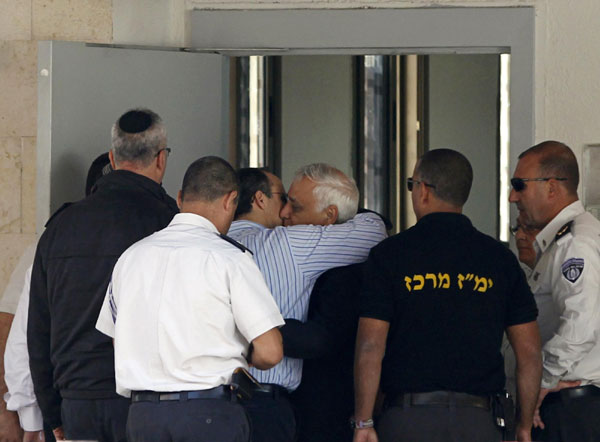Former Israeli President arrives at prison
Updated: 2011-12-07 17:27
(Agencies)
|
|||||||||
JERUSALEM — Former Israeli President Moshe Katsav entered a minimum security prison on Wednesday to start serving a seven-year sentence for rape, but not before defiantly accusing the state of Israel of "executing" an innocent man.
|
 Former Israeli President Moshe Katsav (3rd R) is hugged by his son before entering Maasiyahu prison in Ramle near Tel Aviv December 7, 2011.[Photo/Agencies] |
The day was a bittersweet one for Israel, both shameful because the former holder of a lofty office was going behind bars for such a heinous crime and at the same time, a point of honor because it showed that even a president is equal before the law in Israel.
Katsav, 66, was convicted last December of raping a former female employee when he was a Cabinet minister and of sexually harassing two other women when he was president from 2000 to 2007. The former president, who repeatedly has professed his innocence, remained free while he appealed his case, but the Supreme Court upheld the conviction last month and ordered him to prison.
TV footage showed him entering the Maasiyahu prison in central Israel, where he became the highest-ranking Israeli official ever to spend time behind bars.
Katsav looked agitated and overwhelmed as he ventured from his house in the southern town of Kiryat Malachi to address the hordes of journalists who had gathered there before he set off on the hourlong drive to Maasiyahu prison. In a brief statement, Katsav accused authorities of ignoring evidence that he said could clear him but predicted that one day, "the truth will come to light."
"The state of Israel is executing a man today on the basis of impressions, without real time testimony, without evidence," Katsav railed. "One day, consciences will prick and you will see that you buried a man alive."
In the absence of forensic evidence, prosecutors built their case almost entirely on witness testimony. Legal experts say the similarities in the accounts of victims who did not know each other likely led to the conviction, in which the judges accused Katsav of lying.
Prison officials say he will be placed in a special section of Maasiyahu reserved for observant Jews and share a cell with Shlomo Benizri, a former Cabinet minister convicted of accepting bribes.
Prisons service spokesman Sivan Weizman said inmates in the religious section are woken at 4:30 a.m., attend morning prayers and spend most of their day in religious study. They have no access to television and receive family visits every two weeks.
After serving a quarter of his sentence, Katsav could become eligible for short furloughs and even apply to have his term shortened.
Officials said security would be beefed up around the former president — both as part of a suicide watch placed on all new prisoners and to prevent other prisoners from harming him. Katsav's lawyers have expressed concerns that the distraught politician might try to harm himself.
Israel's presidency is a largely ceremonial office, typically filled by a respected elder statesman expected to rise above politics and serve as a moral beacon. That made the allegations against Katsav all the more shocking.
The case broke in 2006 after Katsav, still the sitting president, told police one of his accusers was trying to extort money from him. The lurid details stunned Israelis who had tended to see him more as a bland functionary than a predatory boss who repeatedly used his authority to force sexual favors.
The twists and turns of the case both riveted and appalled the country. In one memorable moment, the Iranian-born Katsav held a news conference to accuse prosecutors and the media of plotting his demise because he didn't belong to the country's European-descended elite.
Katsav reluctantly resigned two weeks before his seven-year term was to expire in 2007 under a plea bargain that would have allowed him to escape jail time. He then stunned the nation again by rejecting the plea bargain and vowing to prove his innocence in court.
He has said he did not regret that decision because it would have meant he confessed to a crime he says he did not commit.











